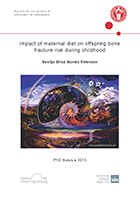PhD defence: Impact of maternal diet on offspring bone fracture risk during childhood
Sesilje Bondo Petersen
PhD thesis
Fetal programming is an emerging concept that links environmental conditions during embryonic and fetal development with risk of diseases later in life. A hypothesis for fetal programming of bone health state that peak bone mass may be modified by environmental influences during fetal life, including maternal diet and vitamin D status. However, few studies have investigated whether these factors during pregnancy impact offspring bone health in short as well as in the long term.
The overall objective of this thesis was to investigate epidemiologically whether maternal vitamin D status and dietary patterns in two prospective pregnancy cohorts, were associated with offspring risk of bone fractures in childhood.
Overall, our studies provided limited support to the hypothesis that fetal bone health is programmed by the maternal vitamin D status and overall diet during pregnancy. However, there were some indications of an increased risk for fractures when the mother consumed a Western diet and had high consumption of artificially sweetened soft drinks. Further, our results indicated that mid-pregnancy use of dietary supplements with high doses of vitamin D increased the risk for offspring fractures.
2015, 131 pages,
ISBN 978 87 8914 827 4
Time
27 February 2015, 13:00
Venue
Jernesalen, Jernesalen, building 206, Statens Serum Institute, Artillerivej 5, 2300 København S.
Opponents
Associate professor Lotte Lauritzen (chair), Department of Nutrition, Exercise and Sports, University of Copenhagen, Denmark.
Laufey Steingrimsdottir, Unit for Nutrition Research, Landspitali - University Hospital, Iceland.
Vibeke Kildegaard Knudsen, National Food Institute, Division of Nutrition, Denmark.
Supervisors
Associate professor Christian Mølgaard, Department of Nutrition, Exercise and Sports, University of Copenhagen, Denmark.
Marin Strøm, Statens Serum Institute, Copenhagen, Denmark.
Sjurdur Frodi Olsen, Statens Serum Institute, Copenhagen, Denmark.

